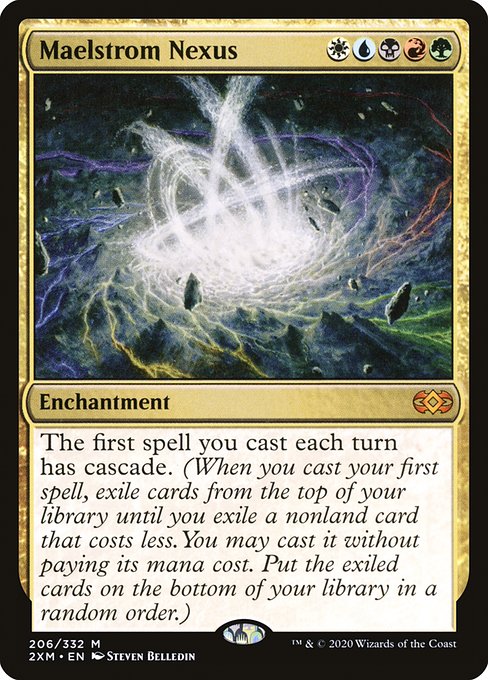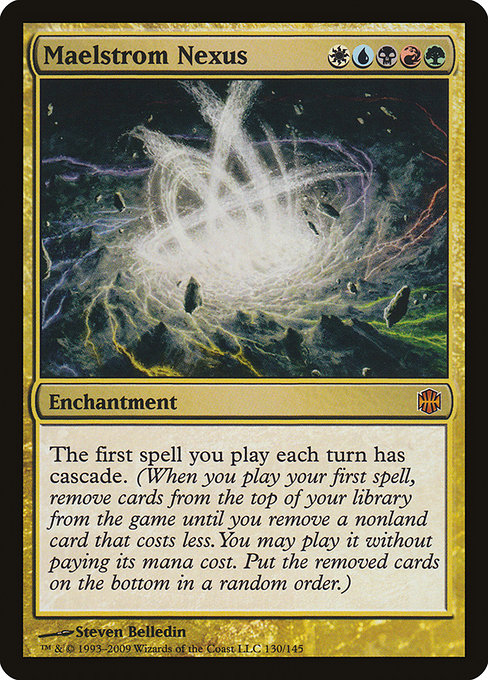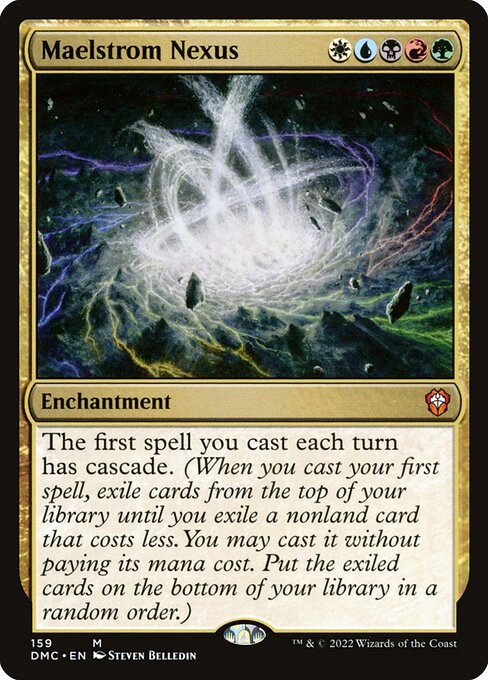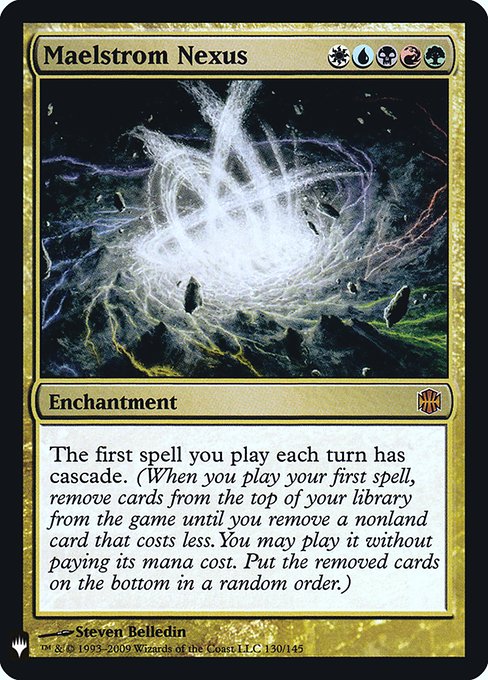Mahlstrom-Nexus
Verzauberung
Der erste Zauberspruch, den du pro Zug wirkst, hat Kaskade. (Wenn du deinen ersten Zauberspruch wirkst, schicke solange die oberste Karte deiner Bibliothek ins Exil, bis du eine Nichtland-Karte ins Exil schickst, die weniger kostet als der erste Zauberspruch. Du kannst sie wirken, ohne ihre Manakosten zu bezahlen. Lege die so ins Exil geschickten Karten in zufälliger Reihenfolge unter deine Bibliothek.)
standard
future
historic
gladiator
pioneer
explorer
modern
legacy
pauper
vintage
penny
commander
brawl
historicbrawl
alchemy
paupercommander
duel
oldschool
premodern
Rulings
If the first spell you cast in a turn already has cascade, both cascade abilities will trigger separately. Deal with them one at a time: First one cascade ability will resolve, and you'll cast the applicable card if you want. That new spell will resolve. Then the other cascade ability will resolve in the same way. Finally, the original spell will resolve.
This effect takes into account spells that were cast earlier in the turn before Maelstrom Nexus entered the battlefield, including any spells still on the stack. If you've already cast any spells that turn (including Maelstrom Nexus itself), this ability won't give any of your spells cascade that turn.
If a spell with cascade is countered, the cascade ability will still resolve normally.
The mana value of a split card is determined by the combined mana cost of its two halves. If cascade allows you to cast a split card, you may cast either half but not both halves.
You exile the cards face up. All players will be able to see them.
Cascade triggers when you cast the spell, meaning that it resolves before that spell. If you end up casting the exiled card, it will go on the stack above the spell with cascade.
When the cascade ability resolves, you must exile cards. The only optional part of the ability is whether or not you cast the last card exiled.
Due to a recent rules change to cascade, not only do you stop exiling cards if you exile a nonland card with lesser mana value than the spell with cascade, but the resulting spell you cast must also have lesser mana value. Previously, in cases where a card's mana value differed from the resulting spell, such as with some modal double-faced cards or cards with an Adventure, you could cast a spell with a higher mana value than the exiled card.
If you cast a card “without paying its mana cost,” you can't choose to cast it for any alternative costs. You can, however, pay additional costs. If the card has any mandatory additional costs, you must pay those to cast the card.
If the card has in its mana cost, you must choose 0 as the value of X when casting it without paying its mana cost.
A spell's mana value is determined only by its mana cost. Ignore any alternative costs, additional costs, cost increases, or cost reductions.
This effect takes into account spells that were cast earlier in the turn before Maelstrom Nexus entered the battlefield, including any spells still on the stack. If you've already cast any spells that turn (including Maelstrom Nexus itself), this ability won't give any of your spells cascade that turn.
If a spell with cascade is countered, the cascade ability will still resolve normally.
The mana value of a split card is determined by the combined mana cost of its two halves. If cascade allows you to cast a split card, you may cast either half but not both halves.
You exile the cards face up. All players will be able to see them.
Cascade triggers when you cast the spell, meaning that it resolves before that spell. If you end up casting the exiled card, it will go on the stack above the spell with cascade.
When the cascade ability resolves, you must exile cards. The only optional part of the ability is whether or not you cast the last card exiled.
Due to a recent rules change to cascade, not only do you stop exiling cards if you exile a nonland card with lesser mana value than the spell with cascade, but the resulting spell you cast must also have lesser mana value. Previously, in cases where a card's mana value differed from the resulting spell, such as with some modal double-faced cards or cards with an Adventure, you could cast a spell with a higher mana value than the exiled card.
If you cast a card “without paying its mana cost,” you can't choose to cast it for any alternative costs. You can, however, pay additional costs. If the card has any mandatory additional costs, you must pay those to cast the card.
If the card has in its mana cost, you must choose 0 as the value of X when casting it without paying its mana cost.
A spell's mana value is determined only by its mana cost. Ignore any alternative costs, additional costs, cost increases, or cost reductions.
Rulings
If the first spell you cast in a turn already has cascade, both cascade abilities will trigger separately. Deal with them one at a time: First one cascade ability will resolve, and you'll cast the applicable card if you want. That new spell will resolve. Then the other cascade ability will resolve in the same way. Finally, the original spell will resolve.
This effect takes into account spells that were cast earlier in the turn before Maelstrom Nexus entered the battlefield, including any spells still on the stack. If you've already cast any spells that turn (including Maelstrom Nexus itself), this ability won't give any of your spells cascade that turn.
If a spell with cascade is countered, the cascade ability will still resolve normally.
The mana value of a split card is determined by the combined mana cost of its two halves. If cascade allows you to cast a split card, you may cast either half but not both halves.
You exile the cards face up. All players will be able to see them.
Cascade triggers when you cast the spell, meaning that it resolves before that spell. If you end up casting the exiled card, it will go on the stack above the spell with cascade.
When the cascade ability resolves, you must exile cards. The only optional part of the ability is whether or not you cast the last card exiled.
Due to a recent rules change to cascade, not only do you stop exiling cards if you exile a nonland card with lesser mana value than the spell with cascade, but the resulting spell you cast must also have lesser mana value. Previously, in cases where a card's mana value differed from the resulting spell, such as with some modal double-faced cards or cards with an Adventure, you could cast a spell with a higher mana value than the exiled card.
If you cast a card “without paying its mana cost,” you can't choose to cast it for any alternative costs. You can, however, pay additional costs. If the card has any mandatory additional costs, you must pay those to cast the card.
If the card has in its mana cost, you must choose 0 as the value of X when casting it without paying its mana cost.
A spell's mana value is determined only by its mana cost. Ignore any alternative costs, additional costs, cost increases, or cost reductions.
This effect takes into account spells that were cast earlier in the turn before Maelstrom Nexus entered the battlefield, including any spells still on the stack. If you've already cast any spells that turn (including Maelstrom Nexus itself), this ability won't give any of your spells cascade that turn.
If a spell with cascade is countered, the cascade ability will still resolve normally.
The mana value of a split card is determined by the combined mana cost of its two halves. If cascade allows you to cast a split card, you may cast either half but not both halves.
You exile the cards face up. All players will be able to see them.
Cascade triggers when you cast the spell, meaning that it resolves before that spell. If you end up casting the exiled card, it will go on the stack above the spell with cascade.
When the cascade ability resolves, you must exile cards. The only optional part of the ability is whether or not you cast the last card exiled.
Due to a recent rules change to cascade, not only do you stop exiling cards if you exile a nonland card with lesser mana value than the spell with cascade, but the resulting spell you cast must also have lesser mana value. Previously, in cases where a card's mana value differed from the resulting spell, such as with some modal double-faced cards or cards with an Adventure, you could cast a spell with a higher mana value than the exiled card.
If you cast a card “without paying its mana cost,” you can't choose to cast it for any alternative costs. You can, however, pay additional costs. If the card has any mandatory additional costs, you must pay those to cast the card.
If the card has in its mana cost, you must choose 0 as the value of X when casting it without paying its mana cost.
A spell's mana value is determined only by its mana cost. Ignore any alternative costs, additional costs, cost increases, or cost reductions.
Votre collection ? vos decks ?
Envie de gérer votre collection et/ou créer des decks ?



 0
0
 1.10€
1.10€


